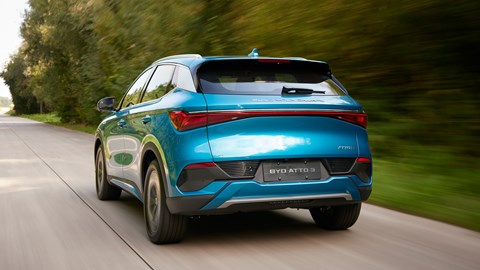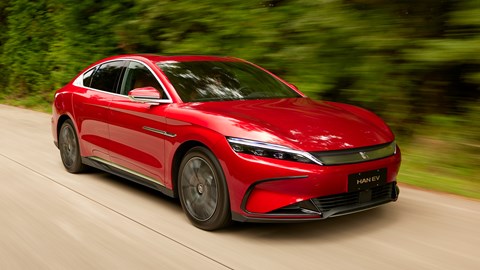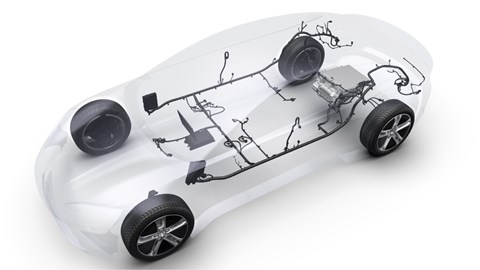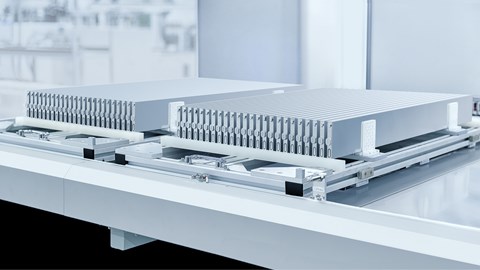► Chinese brand plans EV domination
► C-segment Atto 3 SUV coming to UK
► First cars to arrive in early 2023
BYD, the Chinese electric vehicle manufacturer and technology company, will start selling cars in the UK in the first quarter of 2023. The brand’s first global car, the pure-electric Atto 3 family SUV, will arrive on British shores soon, becoming a fresh rival for the likes of the Renault Megane E-Tech Electric and the Kia Niro EV.
BYD has partnered with several UK dealer groups, including Pendragon, Lookers and Arnold Clark. More dealer partners will be announced in the coming weeks, along with UK pricing for the BYD Atto 3. In Europe, the Atto 3 is priced at a competitive €38,000, which works out at around £33,400 at the current exchange rate. That puts it into the same ballpark as the most expensive versions of the MG ZS EV.
The Atto 3’s performance sounds like it’s right on the money for the family EV class. It’s powered by a 60kWh battery pack which feeds a 201bhp electric motor mounted on the front axle. BYD says the car has a maximum WLTP range of around 260 miles.

In Europe, BYD will also sell its Han saloon and Tang SUV, both of which have 510bhp dual-motor powertrains. The Han has a maximum WLTP range of 324 miles while the Tang can cover 250 miles. Sadly, we won’t get either of those cars in the UK, as they’re based on the brand’s previous-generation e-Platform 2.0 which isn’t compatible with right-hand drive layouts.
The Atto 3 is based on BYD’s latest e-Platform 3.0, introduced in 2021. More on this below.
BYD? Who’s that?
BYD (an initialism standing for ‘Build Your Dreams’) is China’s biggest electrified vehicle manufacturer. It has topped the country’s sales charts for the past nine years in a row – and has now spotted a gap in the European market that it reckons it can exploit.
The company isn’t exactly new to the UK, either. BYD has supplied London with 500 pure-electric buses since 2016 and the firm has a partnership with the British commercial vehicle brand Alexander Dennis to get the vehicles into the capital more easily. The pair operate an assembly plant in Falkirk, Scotland, in which BYD’s batteries and motors are bolted into ADL’s bus bodies.
BYD was founded back in 1995 as a battery manufacturer and has steadily expanded its operations to the electronics, automotive, commercial vehicle and rail transit sectors. And, because its business straddles such a broad variety of industries, BYD has been forced to get its supply chain in order – which puts it at a distinct advantage when compared to its European competitors.

The Chinese firm makes everything it needs to build its cars in-house (we’re talking battery packs, electric motors, motor control units and those all-important semi-conductors), which means it hasn’t been as badly affected by the ongoing parts supply crash.
So, when BYD rolls onto the UK market in early 2023, it says it will start supplying customers with cars immediately. That’s an attractive prospect for UK car buyers, as wait times for cars from tried-and-tested manufacturers like Volkswagen and BMW currently stretch to several months.
BYD’s broader mission is to lower global temperatures by one degree Celsius (although it hasn’t yet set a deadline for this decrease in temperature). To help achieve this, the brand has already ceased production of all its combustion engine cars and now plans to focus all its efforts on its pure-electric vehicles.
Tell us more about the BYD’s electric platform
All the BYD cars we’ll get in the UK will be built on the company’s new e-Platform 3.0 chassis. It’s a modular electric platform, on which the company can build everything from a dinky hatchback to a flagship SUV. The chassis also allows for front-, rear- and four-wheel drive motor configurations.
The Atto 3 will soon become the company’s entrant for the UK’s hotly contested C-segment SUV class – but the brand’s Assistant General Manager Brian Yang has confirmed that BYD could easily expand into the B-, C- and D-segments depending on public demand.
When quizzed on BYD’s plans for an affordable small hatchback, he said: ‘We always look at ourselves and then look at the demand from the customer from the market. So, if there is, let’s say, a strong demand from the customer side for a really small sized car. Yeah. Why not?’

BYD already has a small electric hatchback on sale in China called the Dolphin – and it shouldn’t be too difficult for the company to re-engineer the car for the European market because that’s exactly what the brand did with the Atto 3.
If BYD can launch a version of the Dolphin in Europe before 2025 (which seems feasible considering the R&D is already done and the car is on sale), it will beat Volkswagen’s affordable electric car project to market and provide the company with a more direct rival to the MG 4 EV. Watch this space.
Does BYD have any other clever technology?
BYD is quite vocal about its Blade battery pack. Battery safety is a huge concern in China (a few EV drivers have lost their homes because faulty battery packs in their cars have burst into flames while charging), so the company has designed a battery pack to alleviate the fears of the Chinese public.
The chemistry is a little different to that found in the batteries of most European EVs. It’s a lithium iron-phosphate design rather than a lithium-ion unit. The key difference is that BYD’s batteries don’t use cobalt, which is a notoriously polluting material to extract from the earth’s crust – and that ties in nicely with the eco-conscious image the brand is trying to curate.

BYD confidently told us that its lithium-iron phosphate batteries are safer than lithium-ion units, as they’re more stable and more durable. The company says that you can drive a nail into the wall of the battery pack, and it won’t smoke or ignite. The firm also says its Blade battery has survived being crushed, bent, massively overcharged and heated in a furnace to 300 degrees Celsius without combusting.
BYD’s engineers were keen to point out that its Blade battery adds structural support to the e-Platform 3.0, too. The brand explained to us how the battery makes the chassis more rigid – and it expects this design will pay dividends once it’s time to put its cars through the Euro NCAP crash tests. Brian Yang told CAR Magazine that his engineers are hoping for a full five-star safety rating for the Atto 3 SUV.